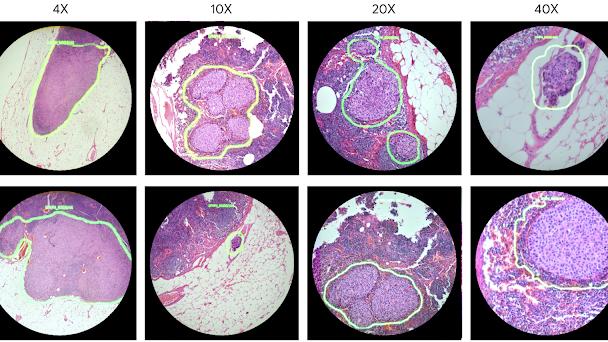machinelarning
Latest

Google made an AR microscope that can help detect cancer
In a talk given today at the American Association for Cancer Research's annual meeting, Google researchers described a prototype of an augmented reality microscope that could be used to help physicians diagnose patients. When pathologists are analyzing biological tissue to see if there are signs of cancer -- and if so, how much and what kind -- the process can be quite time-consuming. And it's a practice that Google thinks could benefit from deep learning tools. But in many places, adopting AI technology isn't feasible. The company, however, believes this microscope could allow groups with limited funds, such as small labs and clinics, or developing countries to benefit from these tools in a simple, easy-to-use manner. Google says the scope could "possibly help accelerate and democratize the adoption of deep learning tools for pathologists around the world."

AI-powered face swapping has taken a dystopian turn
As if the issues like revenge porn and AI-powered facial recognition searches weren't creepy enough, a Motherboard report reveals yet another unsettling use of technology: "deepfakes." Within a month of locating a Redditor who used machine learning to swap pictures of mainstream actresses onto the bodies of women performing in porn movies, the outlet has found people using an app based on his techniques to create videos using images of women they know.

CNBC: Secret team at Amazon is working on health care projects
A report by CNBC connects several threads that apparently lead to an Amazon stealth team working on health related projects. Dubbed 1492 (because healthcare from Columbus worked out great for so many people), the team is apparently working on hardware and software projects. Late last fall, CEO Jeff Bezos mentioned that Alexa and Echo devices could be a tool for both providers and patients. Separately, the company is investing in cancer-testing startup Grail and recently hired the former director of healthcare and life sciences at Box.

AI will shape health care plans for US veterans
American veterans needing health care are about to get help from an unusual source: artificial intelligence. The Department of Veterans Affairs and Flow Health have forged a 5-year alliance that will see the two build a massive medical knowledge graph (based on the records of 22 million veterans) that uses deep learning to customize health plans for vets. The system aims to identify the common genetic factors that make people vulnerable to given diseases and not only improve diagnoses, but recommend treatments on a case-by-case basis.

Google's 'Magenta' project will see if AIs can truly make art
Google's next foray into the burgeoning world of artificial intelligence will be a creative one. The company has previewed a new effort to teach AI systems to generate music and art called Magenta. It'll launch officially on June 1st, but Google gave attendees at the annual Moogfest music and tech festival a preview of what's in store. As Quartz reports, Magenta comes from Google's Brain AI group -- which is responsible for many uses of AI in Google products like Translate, Photos and Inbox. It builds on previous efforts in the space, using TensorFlow -- Google's open-source library for machine learning -- to train computers to create art. The goal is to answer the questions: "Can machines make music and art? If so, how? If not, why not?"

Lie detection software learns from real court cases
Machine learning has been used to make computers guess your age, count calories and even do our jobs, but University of Michigan researchers are applying it to lie detection. In this case they used testimony from real court cases to try and decipher a liar's tells when the stakes are at their highest. Considering both the words and gestures of the person speaking, they claim it was up to 75 percent accurate at identifying if a person is lying or telling the truth, while humans could only tell 50 percent of the time.



